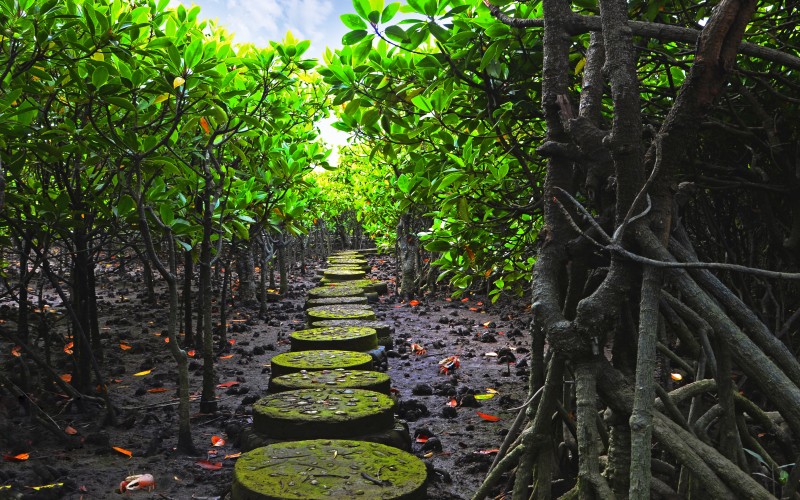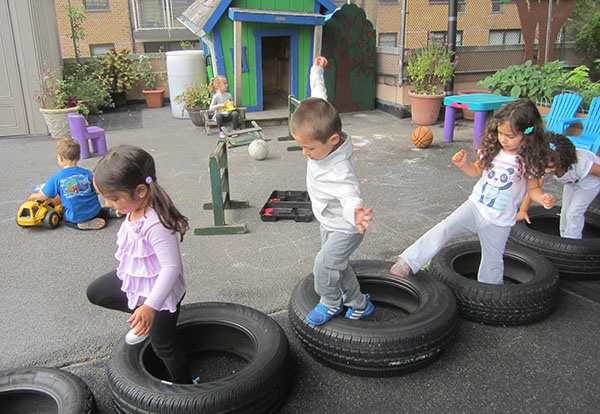Solution for: The Mangrove Regeneration Project
Answer Table
| 1. flooding | 6. gray |
| 2. firewood | 7. hothouse |
| 3. fertilizer | 8. rain |
| 4. trash | 9. rabbit |
| 5. sand | 10. storm |
Exam Review
The Mangrove Regeneration Project

You will hear part of a student presentation about a conservation project on the Florida coast of the United States.
Today I'm going to be talking about the first year of a regeneration project in a mangrove forest. Mangrove forests are found along river estuaries and coastlines, and are important because they prevent flooding by acting as a barrier between the land and sea. The mangrove trees have special roots which can breathe and allow them to survive in thick, airless mud. They are also a very important habitat for wading birds, fish and other animals. In the area where the project is taking place. There have been a number of problems since the area was first settled over 100 years ago. Many of the mangrove trees were initially burnt as firewood by local fanners. The mangrove forests were also poisoned by settlers farming methods, because the farmers used fertilizer to increase crop yields. And this started to seep into the water, eventually killing part of the mangrove forest. Fanning in the area wasn't successful. And what was left of the mangrove forest area wasn't valued by local people as crops couldn't be grown there. And so what happened was that the area started to be used as somewhere to dump trash.
Action was urgently needed to protect the mangrove forest and prevent flooding. And so the mangrove regeneration project was set up. The conservationists involved decided to construct a sand barrier around the forests, but unfortunately, this proved to be ineffective. The only way forward appeared to be to grow new mangroves from seed. Several species of mangrove inhabit the forests in this area of the United States, but it is the gray mangroves that we are concerned with here. The seed of this plant is about the size of an almond, and most seeds fall only when they are fully ripe.
The mangrove regeneration project first began three years ago, the first set of seedlings was planted in small pots and left to germinate in a hothouse. The plants thrived, and large roots appeared at the bottom of the pots. Ideally, the seedlings should have been conditioned with increasingly salty water before being planted in the sea. They had in fact, only been watered with rainwater. As the plants weren't used to a saline environment, it was decided to plant them out on the south side of a small island nearby. It was hoped that this would allow them to get used to salt water gradually, since this part of the island was flooded every day at high tide. There were over 100 plants planted in this particular spot, and it was necessary to protect them, not from the large number of wading birds which visit the area looking for food, but from the large rabbit colony living in the area. The process for the second set of seedlings was completely different, young seedlings were collected from the forests and then taken to a new site. The seedlings were then planted in the seabed behind old mangrove roots for protection. However, this method did not prove very successful, and the vast majority of the seedlings were washed away in a storm. Luckily, the first set of seedlings survived. And this method is the one which the project will continue to use in the future. Now I'd like to describe in more detail that….
Questions 1-10
Complete the notes below
Write NO MORE THAN TWO WORDS for each answer.
The Mangrove Regeneration Project
Mangrove forests:
- protect coastal areas from 1 by the sea
Answer: flooding Locate - are an important habitat for wildlife
Problems:
- mangroves had been used by farmers as 2
Answer: firewood Locate - mangroves were poisoned by the use of 3
Answer: fertilizer Locate - local people used the mangroves as a place to put their 4
Answer: trash Locate
Actions taken to protect the mangroves:
- a barrier which was made of 5
Answer: sand Locate was constructed - but it failed - new mangroves had to be grown from seed
- the seeds of the 6 mangrove were used
Answer: gray Locate
First set of seedlings:
- kept in small pots in a 7
Answer: hothouse Locate - Watered with 8 water
Answer: rain Locate - planted out on south side of a small island
- at risk from the large 9 population
Answer: rabbit Locate
Second set of seedlings:
- planted in the seabed near established mangrove roots
- the young plants were destroyed in a 10
Answer: storm Locate
Results:
The first set of seedlings was successful
Other Tests
-
Total questions: 10
- 6- Plan, map, diagram labelling
- 4- Summary, form completion
-
Total questions: 10
- 10- Summary, form completion
-
Total questions: 10
- 10- Summary, form completion
-
Total questions: 10
- 5- Matching
- 5- Sentence Completion
-
Total questions: 10
- 4- Matching
- 6- Summary, form completion
-
Total questions: 10
- 7- Summary, form completion
- 3- Sentence Completion










